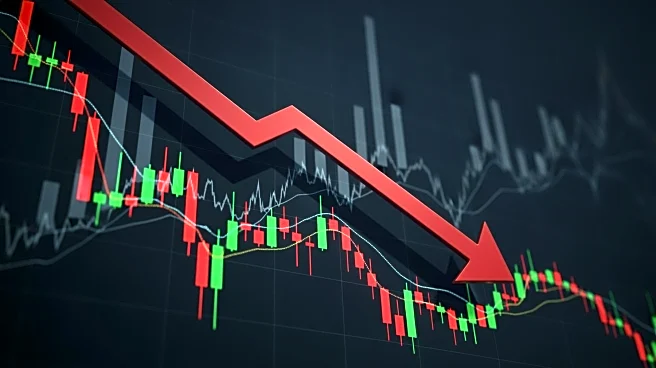What's Happening?
Several stocks in the S&P 500, including Fiserv and DoorDash, have been identified as oversold following a challenging week for the broader market. The Nasdaq experienced its worst week since April, driven
by concerns over a potential bubble in artificial intelligence stocks and high valuations in tech companies. Fiserv's stock plummeted 44% on October 29, marking its worst day ever, after the company reduced its full-year guidance and announced changes in its executive leadership. The decline was attributed to Argentina's economic downturn, which had previously contributed significantly to Fiserv's growth. DoorDash also saw a significant drop, losing nearly 19% in a week, as it announced plans to invest heavily in new product initiatives, including autonomous delivery. The company's third-quarter profit fell short of analysts' expectations. Other stocks like Royal Caribbean Cruises and Norwegian Cruise Line Holdings were also noted as oversold.
Why It's Important?
The oversold status of these stocks suggests potential for a rebound, which could impact investor strategies and market dynamics. Fiserv's situation highlights the vulnerability of companies to international economic conditions, while DoorDash's investment in new technologies reflects ongoing shifts in the delivery industry. The broader market's reaction to these developments underscores investor sensitivity to economic indicators and corporate earnings. The potential rebound of these stocks could offer opportunities for investors, while the challenges faced by companies like Fiserv and DoorDash may prompt strategic reassessments. Additionally, the market's response to these oversold conditions could influence future investment trends and economic forecasts.
What's Next?
Investors and analysts will likely monitor the performance of these oversold stocks closely, looking for signs of recovery or further decline. Companies like Fiserv may need to address strategic challenges and market perceptions to regain investor confidence. DoorDash's focus on autonomous delivery could set a precedent for innovation in the delivery sector, potentially influencing competitors. The broader market may continue to react to economic data releases and corporate earnings reports, shaping investment strategies and market sentiment. Stakeholders will be keen to see how these companies navigate their respective challenges and capitalize on potential opportunities for growth.










